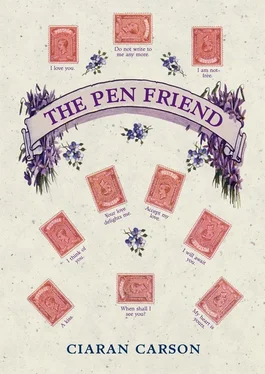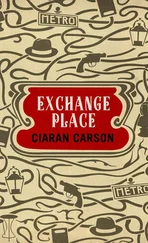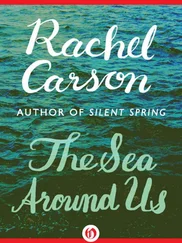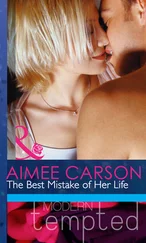You knew my father, Nina, you remember that swaggering walk of his. And you remember how he used to run a Saturday afternoon Esperanto class in an upstairs room of The Compass Bar in Ireland’s Entry, near the Law Courts. He’d tried to persuade you to sign up for the course, you know he’d taken quite a shine to you. And one day in the XL Café you seemed to go along with it for a while, but then, very diplomatically it seemed to me, you wriggled out of it. When he had gone, I said I thought you’d handled the situation very well. Can you see me as an Esperantista? you said. Why not? I said. Well, I just don’t think it’s the kind of movement that attracts women, for one thing, seems more like an old boys’ club to me, you said. And I conceded that I didn’t know many women who were involved in the movement, but I knew that some marriages had been made through Esperanto, and that there were several hundred Esperanto speakers in the world whose first language it was. What a bunch of oddballs they must be, you said. But don’t you think it admirable that two people should fall in love through an ideal, and that they’re prepared to follow that ideal though, by teaching it to their children? I said.
You laughed. Like you, Angel, the way you were brought up in Irish? Don’t you think you’re just a little bit of an oddball yourself? Not that I don’t love you for it. But you don’t seriously believe that these minority pacts are going to change the course of history, these people going around with green stars in their eyes. And speaking of stars, you’re a typical Libra, Angel, you’ll do anything for a quiet time, go with whatever the flow is, you weigh things up and make sure you’re always on the right side of the scales. And maybe it’s not only the stars made you that way, it’s the way you were brought up, between Irish and English. Maybe you don’t really believe in anything, because you know the world is different in Irish than it is in English, you can never decide on what the world really is, or what it should be, you said.
But you know that too, I said, your French is nearly as good as your English, you think in French sometimes. But it’s not native to me, you said, I chose to learn French. Whereas you had no choice, your parents made that choice for you. Then again, maybe it was in their stars, you said. But by the same token, Nina, maybe it was in your stars that you should learn French. Oh, don’t be silly, Angel, you know I really don’t believe in all that stuff, it’s only a metaphor, but if I did, I could say that the stars only give a general picture, it’s up to the individual to fill in the detail, the devil is in the detail, or God, for that matter, wasn’t it Flaubert who said, Le bon Dieu est dans le détail ? Not that he ascribed his own writing to God, he meant that whatever one does, one should do it thoroughly, as best as one can, that’s why he spent days looking for le mot juste , you said.
Well, Nina, Flaubert said a lot of things, didn’t he say that of all lies, art is the least untrue? I could go along with that, I said. Yes, you said, but you think that what you see in art should be true for everybody. And Flaubert said, there is no truth, there is only perception, you said. Oh, for God’s sake, let’s stop this, Nina, we’re starting to sound like Mutt and Jeff, I said. More like Abbott and Costello, you said. Abercrombie and Fitch, I said. Marks and Spencer, you said. Jeeves and Wooster, you said. Gilbert and Sullivan, I said. Lennon and McCartney, you said. Chang and Eng, I said. Who? you said. You know, the Siamese Twins, I said, Yin and Yang. Oh, all right then, Thompson and Thompson, you said. Who? I said. You know, the twins in Tintin, you said. Tintin and Snowy, I said. Dorothy and Toto, you said. Tom and Jerry, I said. The Owl and the Pussycat, you said. Leda and the Swan, I said. Lady and the Tramp, you said. Bubble and Squeak, I said. I don’t see the connection, you said. Well, you can imagine a pair of dogs called Bubble and Squeak, can’t you? I said. Oh, all right then, if you’re going to allow that kind of thing, Fish and Chips, you said. Rhubarb and Custard, I said. Crosse and Blackwell, you said. Smith and Jones, I said. You gave me a querying look. As in Alias, I said. Bonnie and Clyde, you said. Barrow and Furness, I said. What do you mean, Barrow and Furness? you said. You know, the shipbuilding place, like the Clyde, I said. That’s a bit thin, you said, but all right, Samson and Delilah. Samson and Delilah? I said. Yes, Harland and Wolff’s, the two big cranes, they’re called Samson and Goliath, isn’t that right? All right then, Antony and Cleopatra, I said. Abelard and Héloïse, you said. Hero and Leander, I said. Scylla and Charybdis, you said. A rock and a hard place, I said. Gin and tonic, you said, on the rocks. Jekyll and Hyde, it’s a cocktail, I said. First I ever heard of it, you said, I think you’re making it up. But it would be a good name for a cocktail, I said. So would Punch and Judy, for that matter, you said. Or Tom and Jerry, I said. We already had that one, Angel, and besides, I’m tired of this game, Rosencrantz and Guildenstern are dead.
You remember, Nina, we used toy around with pub names, too, though we tried to avoid those silly English names, like The Rat and Parrot, or The Slug and Lettuce, though the disease had crept into Belfast too, there was The Whip and Saddle bar in the Europa Hotel, the most bombed hotel in Europe, where all the foreign correspondents would hang out. No, we tried to make our names plausible, along the model of real Belfast bars like The Elephant, or The Fly, or The White Fort, or The Compass itself, for that matter, whose navigational connotations derived from its being built on the site of a former open dock that was filled in back in the 1870s. Joy’s Basin, they called the dock, it was built by one of the Joy family of Belfast. Joy’s Basin? you said, that would make a good name for a pub. Yes, I said, but maybe a bit in bad taste, the United Irishman Henry Joy came from the same family, they hanged him in Cornmarket in 1798, not too far away. About fifty paces from where the Abercorn Restaurant used to be, I said, remembering that there was still a dock called the Abercorn Basin. At any rate, we came up with The Meridian, and The Plimsoll Line, and The Foremast (there was already a Crow’s Nest), and The Tug, and The Clipper, and Long Haul, and would have considered The Starry Plough, but for its political implications. From there it was an easy step to The Green Star.
My father, in his introductory session, would have delivered to The Compass class a brief biography of Ludwig Zamenhof, mentioning the Irish origins of the green star that was the Esperantist emblem. And he would have outlined to them how Zamenhof arrived at the fundamental principle which was to guide his new language, how one day, when he was seventeen or eighteen, in about 1876 or so, he had been walking to school in Warsaw when suddenly he noticed a sign which read ŠVEJCARSKAYA , meaning place of the porter; in other words, a porter’s lodge; and then he saw another sign which read KONDITORSKAYA , place of sweets, in other words a sweetshop, or confectioner’s. And then, envisioning all the various places of trade and business in Warsaw, the hundreds of grocers and butchers and bakers and candlestick-makers and hairdressers and restaurants and public houses, he saw how by means of a suffix, — skaya , the many could be made one, that one word could be made into other words that need not be separately learned, and hence one did not require a multiplicity of words for the multiplicity of things in the world. A ray of light fell upon those huge, terrifying dictionaries, said Zamenhof, my father would say, and they began to dwindle rapidly before my eyes. So Zamenhof began constructing his language with a basic stock of root words to which a series of prefixes and suffixes could be attached to generate a wealth of different meanings. My father would add that Zamenhof’s Jewishness and his knowledge of Hebrew might also have led him to this illumination, for a logical economy of root consonants is common to both languages. And, my father would proceed, when you come to The Compass class, when we assemble in this upper room, I don’t care whether you are Jew or Catholic or Protestant or Mohammedan, for as Esperantists we are all brothers — and there were indeed no sisters, you were quite right, Nina, in your stylish dress you would have looked out of place among these drab-suited old men and young men who looked older than their age — and though we are few in number, my father would continue, we may, by the grace of the one God that made us all, and by our own efforts, spread the gospel of Esperanto throughout the world.
Читать дальше












